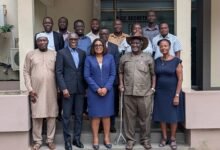
The distribution of premix fuel to fishermen across the country is to be digitised by the end of August this year, Vice President Dr Mahamudu Bawumia, has disclosed.
He said the move was to improve efficiency in the distribution of the fuel, do away with middlemen who mostly divert the product from reaching intended beneficiaries, and to clamp down on smuggling, which has characterised premix fuel distribution.
Speaking at the opening of this year’s Ghana International Petroleum Conference in Accra yesterday, he said the process of digitisation of distribution was already in motion, with registration of all boats and canoes.
The two-day conference, which brought together industry experts, policy makers and other stakeholders, had the theme: ‘Regional Collaboration: A Catalyst for Transformation’.
“There are subsidies to the distribution of premix fuel and wherever there are subsidies, it tends to create wrecks and all sorts of people are found in the middle and the fishermen who the product is made for, do not get them.
“This is because it is smuggled to other people, and so we decided to digitise the process, so that we will be able to attach the subsidies to each boat.
“We are doing this so that you do not have to know someone to be able to get premix to do your fishing and it will really help the fishing communities,” Dr Bawumia stated.
The digitisation processes, he said, would be extended to the distribution of fertilisers to farmers next year.
The Vice President stated that government was in the process of institutional and regulatory realignment of the midstream gas sector through a legislative consolidation by converting the Gas Master Plan into a Gas Act to promote the quest to make Ghana a petrochemical hub in the sub-region.
This, he explained, would address regulatory challenges in the downstream gas sector, bring about certainty to the sub-sector and provide an enabling environment and appropriate incentive for investors moving into the sector.
Among other initiatives, Dr Bawumia stated that government was working on a petroleum transportation infrastructure master plan, aimed at enhancing the pace of infrastructure provision with the region in mind to make the country a key player in the downstream petroleum industry across the sub-region.
This would facilitate the development of alternative transportation infrastructure including railway lines, pipelines and river transportation for petroleum products to demand centres across the country and link Ghana to the sub-regional markets, he added.
If approved by cabinet, the first phase of the master plan, he noted, would be the construction of pipeline to ease the movement of petroleum products from Tema, through Akosombo, Buipe to Bolgatanga.
The Deputy Minister of Energy, Dr Mohammed Amin Adam, noted that Ghana’s quest to become a petroleum hub had been threatened by growing boundaries of the petroleum industry in Africa, which exposes the country risks and danger of disruption, particularly the physical infrastructure on which the industry was built.
The industry, he stated, was also challenged with inefficiencies, leading to various forms of rent seeking, higher cost of operations and poor service delivery.
He said it was imperative that Ghana would take advantage of the global digital revolution to restructure the operations of the industry, reduce cost and ensure competitive pricing of petroleum.
He urged the National Petroleum Authority (NPA) to develop and implement a digitisation plan to expand the country’s digital reach in the petroleum value-chain across the country.
BY YAW KYEI, CLAUDE NYARKO ADAMS AND DANIEL ASANTE







